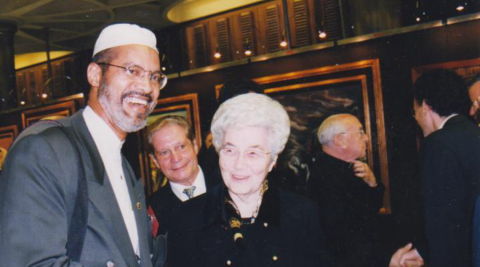
A Dialogue of Life
About the book
A Dialogue of Life – Towards the encounter of Jews and Christians will motivate Jews and Christians to begin “the way of dialogue.” These pages provide accessible tools for anyone taking part in the encounter between people of different cultures or religions. It offers useful tools for those who work in the areas of education (teachers, professors, and catechists), as well as for families.
Article: Authors Dive Deep into Challenges of Catholic-Jewish Dialogue
When you ask someone a question, are you really looking for an answer? Or are you actually trying to make a point under the guise of the inquiry? If Catholics and Jews are ever going to engage in meaningful dialogue with one other, they need to consider this possibility, the authors of a new book told an audience at Fordham Law on Thursday, March 26. Silvina Chemen, rabbi at the Congregation Beth El in Buenos Aires, and Francisco Canzani, PhD, head of the Department of Ecumenism at the Republic of Uruguay Monsignor Mariano Soler spoke about the difficulty of trying to bridge the divides of their respective faiths, noting that they were so dedicated to the pursuit of unity that they wrote the book on the same computer. Although they feel that much of the dialogue between Jews and Catholics, which started with the 1965 Nostra Aetate declaration at Vatican II, has been productive, there is much more to be done.
Click here to read full articleEndorsements
This book was a welcome surprise. I expected another summary of the key developments in Christian-Jewish dialogue, such as are found in statements by various churches. Instead, the book focuses on the dynamics of interreligious dialogue itself, which Silvina Chemen and Francisco Canzani have discovered in their long partnership. The authors largely focus on methodologies of Jewish-Christian dialogue (such as overcoming stereotypes and the relationship between intrareligious and interreligious dialogue) and discuss some of the stumbling blocks (such as concerns about missionizing). The starting point is to build trust. Silvina makes clear that this takes time and “requires perseverance, commitment and some risk.” This message is reinforced in the Afterword. They quote the Argentinian Archbishop of Resistencia, the Most Reverend Ramon Alfredo Dus, who says “Without silence, words lose density and content… We allow the one before us to speak and express himself by being silent instead of clinging to our words and ideas.
Such a beautiful, intelligent book that is a welcome read and not just for those that are interested in interfaith engagement between Christians and Jews... This book surely is a welcome addition to books on the interfaith and dialogue subject, however the dialogues and discussions taking part between the two authors here are so much deeper than just Jewish/Christian interfaith dialogue, so much more than a guide on how to dialogue with mutual respect and understanding, although they do that also and so well ... The chapter on listening is amazing, and highlights why this book is so much more than just a book on dialogue! There is here a book on spirituality and engagement, on pastoral encounter and on theology too. An articulate and excellent book.
What is unique in Silvina Chemen and Francisco Canzani’s book is that they succeed better than any other book known to me in dealing with the challenges and the opportunities of genuine interreligious dialogue. Both authors are extraordinarily sensitive and wise; they offer ways in which our two communities can work together and learn from one another, and find a common basis for dealing with the ethical and political issues of our day. This book provides great insight and hopefully, it will be used as a basis for study, discussion, and action in our interreligious communities.
Beneath the ideas that are presented here with great competence, we can find a certainty: dialogue is possible today, between Christians and Jews or between anyone… and each of us could add that someone or something with whom it might seem impossible to dialogue with. The experience of the authors, the very origin of this book, allows us to state that it is possible to educate in the art of dialogue without losing our own identity. On the contrary, we will find it again more solid than what it was before.
A Dialogue of Life is an excellent book, a gentle introduction to dialogue, highlighting practical challenges and acknowledging the time it takes to establish a trusting full relationship. I would recommend it to anyone considering this journey and it’s an accessible read.
Dialogue of Life is a compelling read. The voices of Silvina and Francisco are an incarnation. The author takes Jewish Christian dialogue to the next plateau of engagement. To quote the author, "this enables unbiased listening." When pause, be still and deeply listen we discover the common foundation that we share.










